13 Weeks of Adventure: Week 9 - Apollo Theatre
A fixture in Black culture and American history, serving as a cornerstone of Harlem for 90 years.
Welcome to Love + Travel, or welcome back if you’re here for more.
Check out the latest about Albertine, the only bookshop in NYC devoted solely to books in French and English, or the entire archive, here.
Three truths:
You can't beat a cookies and cream milkshake.
Spotted lantern flies are disrespectful.
There’s less than a month remaining in summer.
Do with this information what you wish.
Toodles,
RL
The Apollo Theatre is a venue that seems to transcend space and time. Since its inception, it has sat at the intersection of Black culture and American history, serving as a cornerstone of Harlem for 90 years. An eight-year-old Michael Jackson famously rubbed the Tree of Hope again before taking the stage with his brothers and in two weeks, the theatre will kick off the book tour of Supreme Court Justice Ketanji Brown Jackson’s memoir, Lovely One1. The Apollo is more than a concert hall; it’s a cultural institution that continues to inspire generations.
Though it wasn’t always known by its present name, the theater has always been a sensation. Built in 1914, the building was originally known as 'Hurtig & Seamon’s New Burlesque Theatre.' Eventually, it was shut down by Mayor Fiorello LaGuardia, fulfilling his campaign promise to crack down on the burlesque industry throughout the city and the lewd acts it inspired in the alleys and shadowed corners of its buildings. The structure was then purchased by a trio of businessmen and renamed the Apollo Theatre after the Greek god of music, dance, poetry, and truth. The organization as we know it opened its doors on January 26, 1934, welcoming in African-American patrons for the very first time.
From there, it would change hands twice more before being sold to New York State in 1992 with landmark status, cementing its place as a cultural and historical icon.
Presently, Apollo Theatre Foundation Inc., a non-profit organization manages, funds, and programs the 1500-capacity auditorium. They rent the building from the state for $1 annually and maintains the community-centric offerings the establishment is known for. There’s workshops for educators, internships for students, and even 18-month apprenticeships. Donations, performances, and tours—like the one I joined to learn all this—support the renowned venue in serving both the local community and the global music scene.
This was my first visit to the Apollo. Even as a lifelong resident of NYC, I never attended a performance or set foot inside its doors. For my fellow tour attendees, it was their first time, too. Some were local and took the train down from the Bronx. Others came from Chicago, Tampa, and New Orleans. And still, others traveled from as far afield as Ireland and Jamaica. We gathered in the lobby just beyond the souvenir stand and were greeted by undoubtedly the best man to do the job, Mr. Billy Mitchell.
For Mr. Mitchell, his life story interweaves with the Apollo itself. As a teenager, he ran errands, fetching coffee or clothes from the cleaners for stars like Red Foxx, Ray Charles, and Martha Reeves & The Vandellas. Marvin Gaye and James Brown put up money so he could further his education after highschool and he even worked alongside Ralph Cooper, founder of Amateur Night2 at the Apollo. This was after working his way up from an usher guiding people to their seats. He relayed all this from the stage while we looked up at him from the second row - he saves the front in memorain of departed greats.
Through his stories, it becomes clear that it’s the people—whether performers or staff—who make a place special, and Billy is undoubtedly one of those individuals.
As Mr. Mitchell spoke, I took in the scene around me.
The theatre is smaller than I imagined, but it reflects the intimacy of the community it represents. The upper levels seem to loom over the stage, which, quite honestly, makes the idea of being booed in the face that much more intense3. The house retains the gold and white façade along the mezzanine and balcony levels, as seen in Whitney Houston’s Greatest Love of All video. Crystal chandeliers adorn the main walkways at the rear, and drawn red velvet curtains form the backdrop in the opera boxes. There are places on the chairs and floor where the love and years have worn on the theatre, but these marks are a testament to its rich history and enduring legacy, adding character to a place that has seen so many legends rise.
Before exiting, we got a chance to go on stage. The tree of hope stood propped on a golden pedestal and the wall of signatures revealed names like H.E.R., Ghostface Killa and Metallica. We were also given the opportunity to perform a song or joke if we chose to, “Now you can say you performed at the Apollo”, Mr. Mitchell remarked, and yup, what a perspective on life!
I was told by security the tour concluded in the theatre after I tried making my way upstairs to higher floors. Disappointed, I turned and headed straight for the exit. I wanted more from the visit. A place with so much history and entertainment lore makes me feel that even small experiences, like walking its halls or gaining a higher vantage point, can bring me closer to its storied greatness.
Stepping out from the cool embrace of the lobby, the late summer afternoon’s heat enveloped me like a warm, heavy blanket. Before the door could fully shut behind me a family of four crouched to the ground around the theatre’s tiled name. They told me they were visiting from Australia and knew they had to come and visit.
It’s a bit odd—something so historical sandwiched between a store full of beige and a game spot popular for trade-ins. I suppose that’s why I took visiting the Apollo Theatre for granted, up until now.
It’s always been here.
Enduring through the years, evolving with the times, and all the while never losing its significance or commitment to the Harlem community. With renovations on the horizon, I’m glad to have witnessed this storied establishment as it evolves alongside the culture it’s deeply rooted in.
LET ME KNOW
What’s the most memorable theatre or playhouse you’ve visited?
Are you taking for granted any historical landmarks in your neighborhood?
Do you have any superstitions related to physical or creative performance?
Share three truths.
Did y’all know present day winners are awarded $20,000?!?
Like whhhaaaattt? I could never!

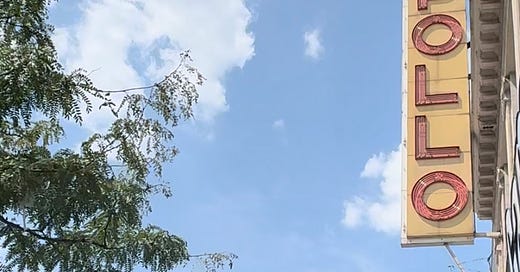


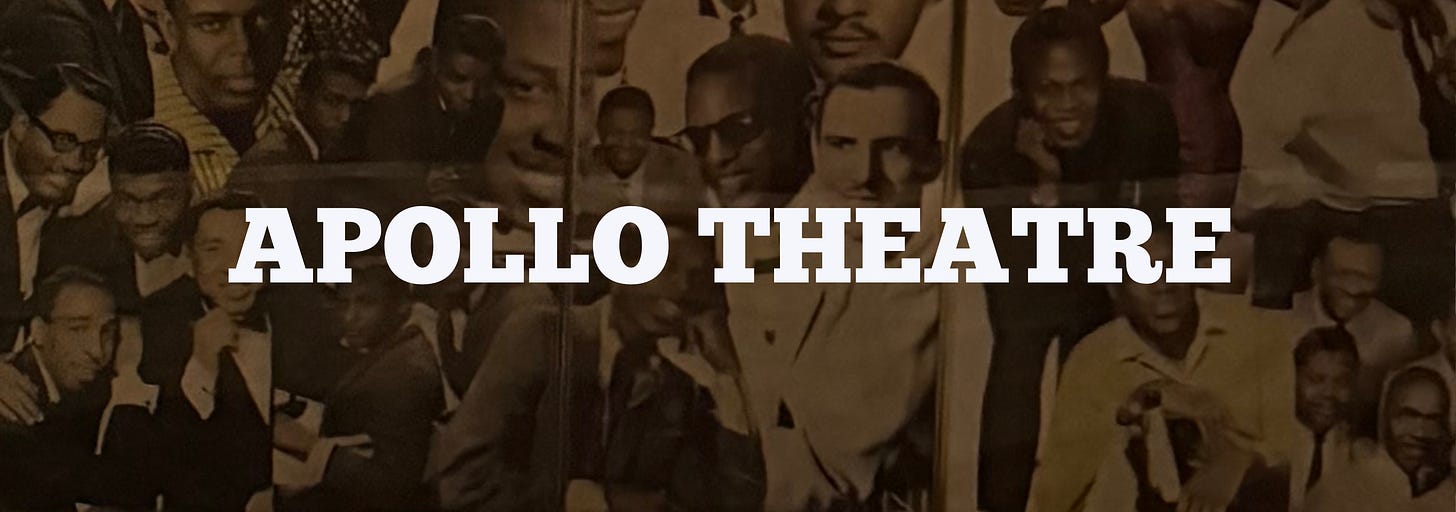
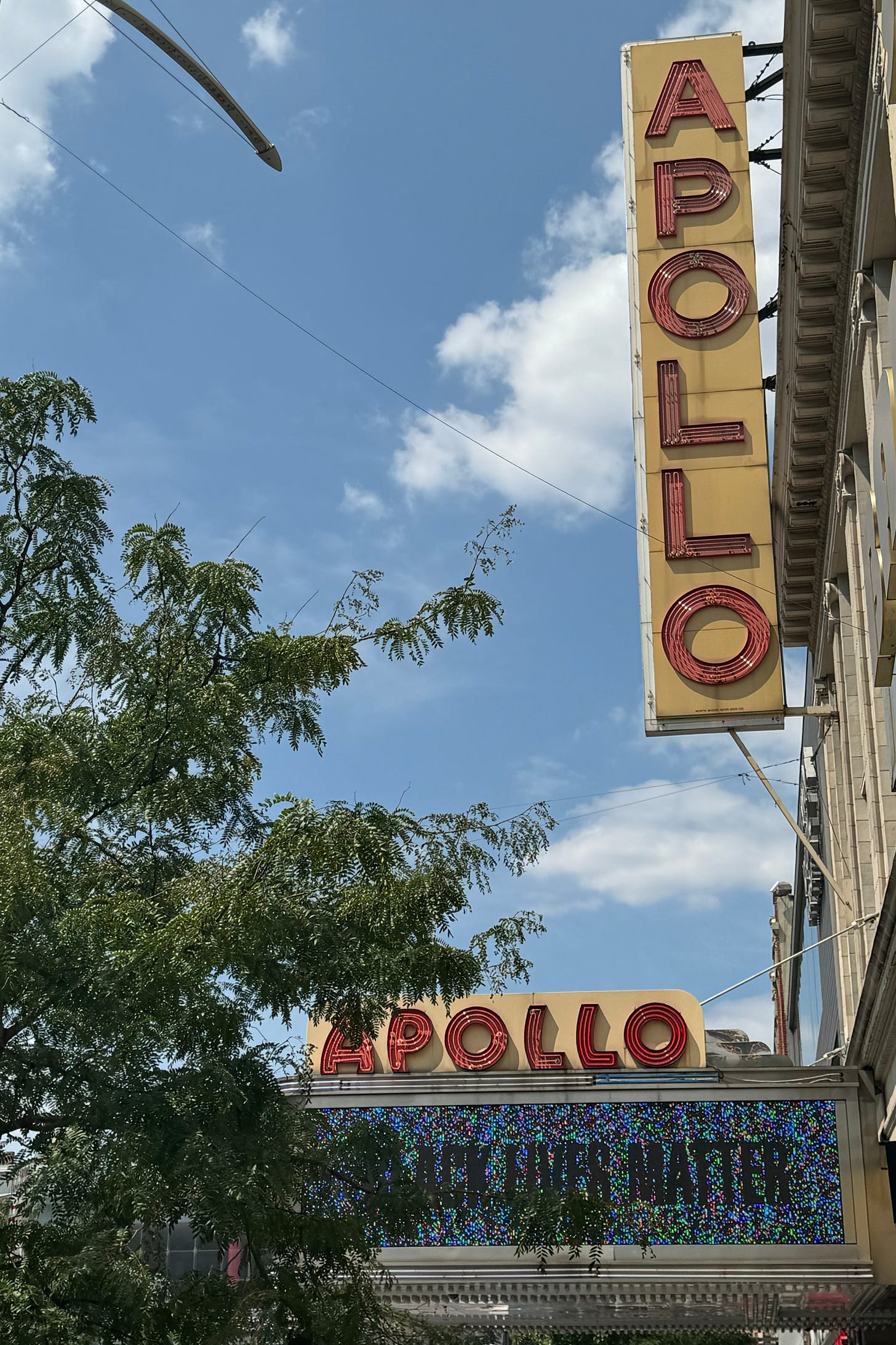
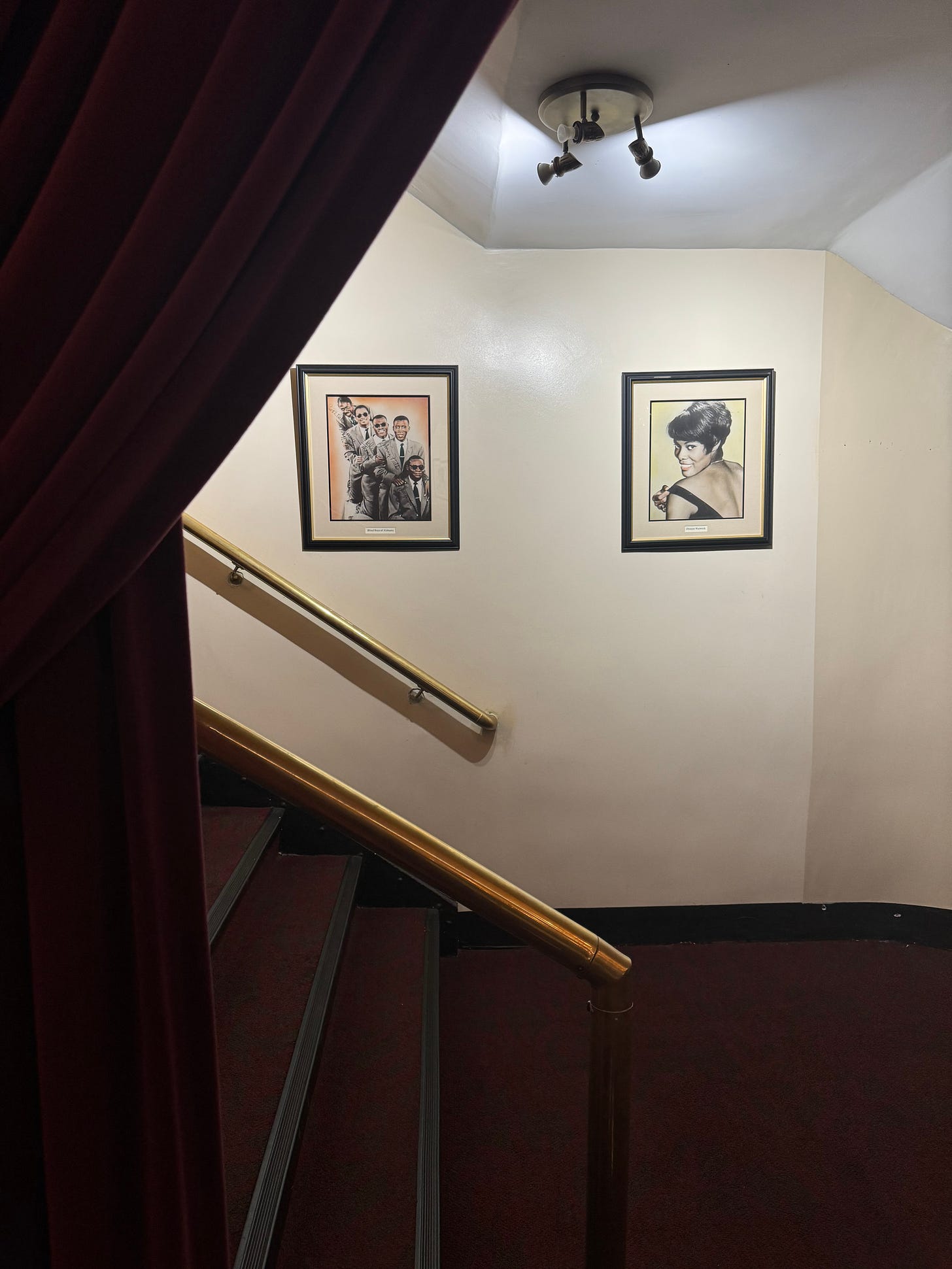
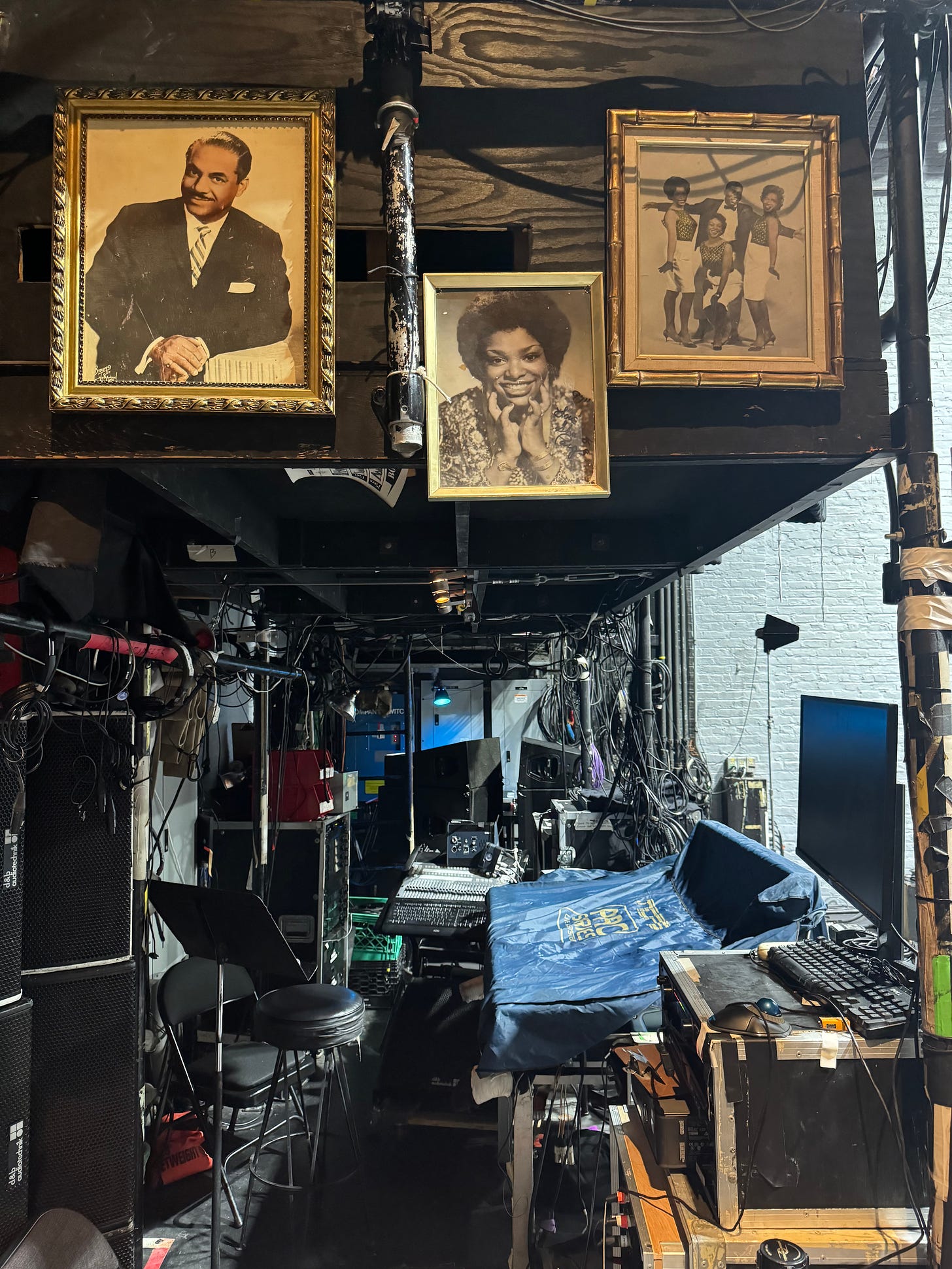
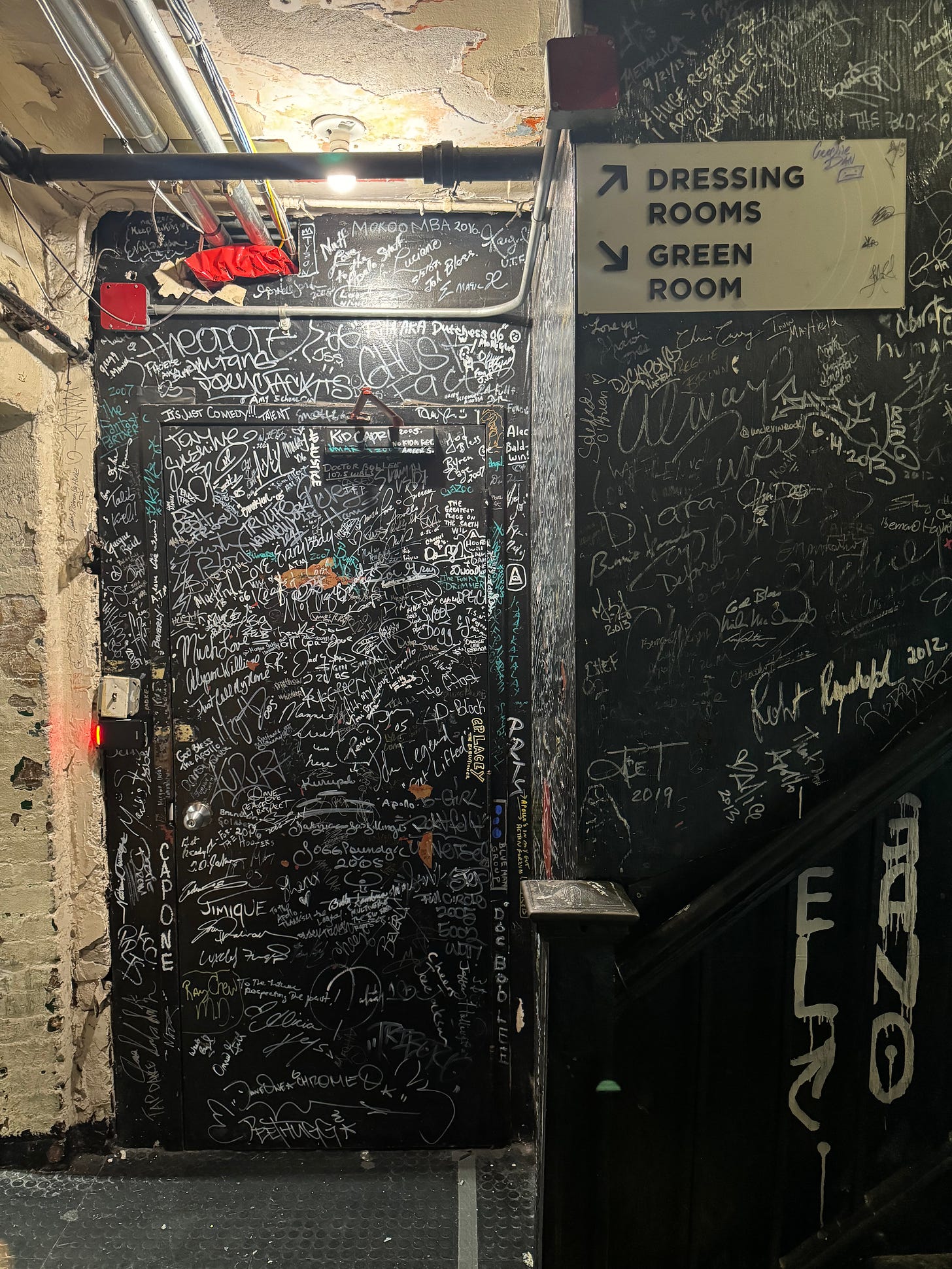
emphasis on lantern flies being disrespectful
This takes me back to being a child watching Apollo as a family- with my mom, grandparents, cousins, aunts, and siblings. It was a culture ritual, a time when there was some togetherness while watching a program at a set time. I remember how baffled I was when audiences made the transition to booing gospel performers. What a time to witness the Apollo.